News
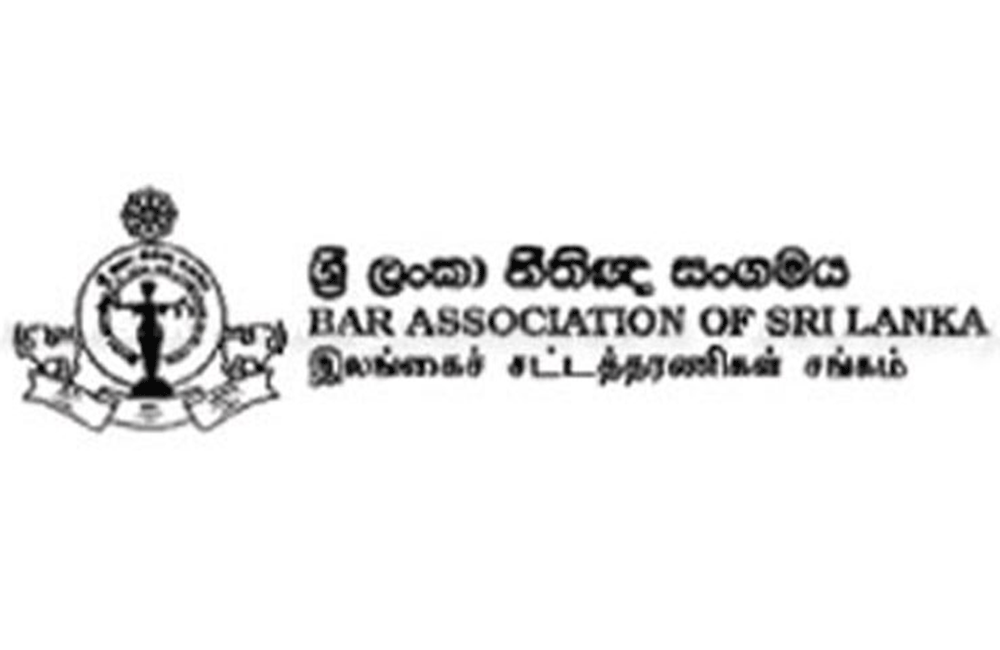
BASL calls for immediate withdrawal of Anti-Terrorism Bill and Online Safety Bill
The Bar Council of the Bar Association of Sri Lanka (BASL) has called upon the Government of Sri Lanka to immediately withdraw the Anti-Terrorism Bill and the Online Safety Bill which were published in the Gazettes issued on 15th and 18th September 2023 respectively, and not to proceed with the said Bills.
At a meeting of the Bar Council held on Saturday (23), it was unanimously resolved that both Bills seriously impinge on the liberty and freedom of the people and will have a serious impact on democracy and the rule of law in the country, BASL said in a statement.
“It is observed that both Bills have been introduced without due consultation with the stakeholders including the BASL. Further, the BASL’s observations on the previous version of the Anti-Terrorism Bill have also not been considered,” it said.
The Bar Association of Sri Lanka has called upon the Government to have a meaningful consultation with the relevant stakeholders including the BASL and to take into consideration their concerns prior to proceeding to Gazette such Bills, which it says have a serious impact on the community at large.
(adaderana.lk)
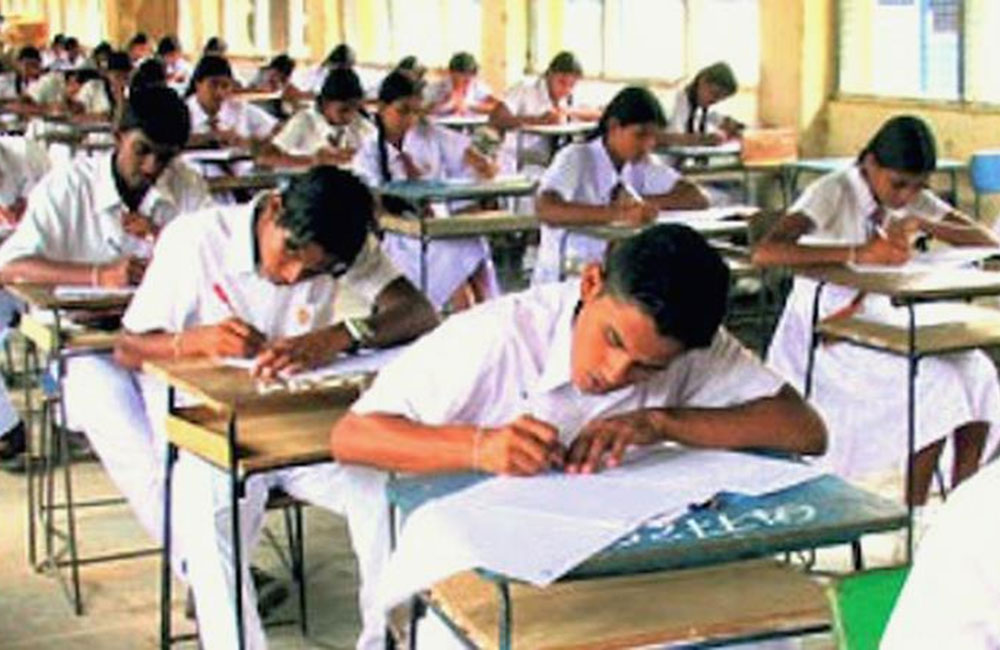
2023 GCE A/L exam postponed
The Commissioner General of the Department of Examinations will announce the revised dates for conducting the 2023 G.C.E. Advanced Level Examination next week, Minister of Education Susil Premajayantha says.
The minister made this remark while delivering a special statement in the parliament this morning (21).
Speaking further, Premajayantha emphasized that a large number of students, as well as the MPs of both the ruling party and the opposition in their capacity as public representatives, have requested to postpone the A/L examination citing several issues.
Repercussions of postponing the 2023 Advanced Level exam to 2024 need to be taken into account [when considering the request], the minister said, mentioning that holding the school examinations and releasing the results have continuously been put off due to certain adversities including the outbreak of the Covid-19 pandemic, trade union actions and the economic crisis.
“Schoolchildren and parents were the ones who were affected by all these issues”.
Furthermore, the Education Minister expressed that admission of students to the universities, admission to the courses conducted by higher educational institutes, and admission to foreign universities have been delayed over the past few years, which cost the students the opportunity to apply for the courses at the minimum prescribed age.
He said the ministry hoped to prevent the exam from being delayed year after year and to provide the students the opportunity to face the exams at the minimum prescribed age in order to pursue higher education.
Meanwhile, the minister pointed out that if the 2023 A/L examination is pushed to January 2024, the 2023 G.C.E. Ordinary Level examination, which is currently planned to be conducted in the months of March and April 2024, will have to be postponed to May or June.
He also explained that as a result, the authorities will be compelled to postpone exams time and time again.
“When the school examination calendar becomes irregular, the school term calendar will also be delayed.”
“This will also cause delays in admission of students to Grade 01”, he stressed.
The minister further warned that this will lead to the loss of opportunities for students to apply for foreign universities and scholarships.
“In addition, recruitments to several government vacancies will face delays, as the delays in releasing examination results will cause the postponement of various corporate examinations”, he added.
Premajayantha asserted that however, the attention of the Examinations Department has been drawn to revise the dates for conducting the 2023 A/L examination, in a manner that does not affect the school term calendar.
The minister highlighted that the decision was arrived at in consideration of the injustice to a considerable number of students who have applied for the examination, following the release of 2022 A/L results.
“Compared to previous years, 18,473 more applications were received for the examination after the results were released”, he added.
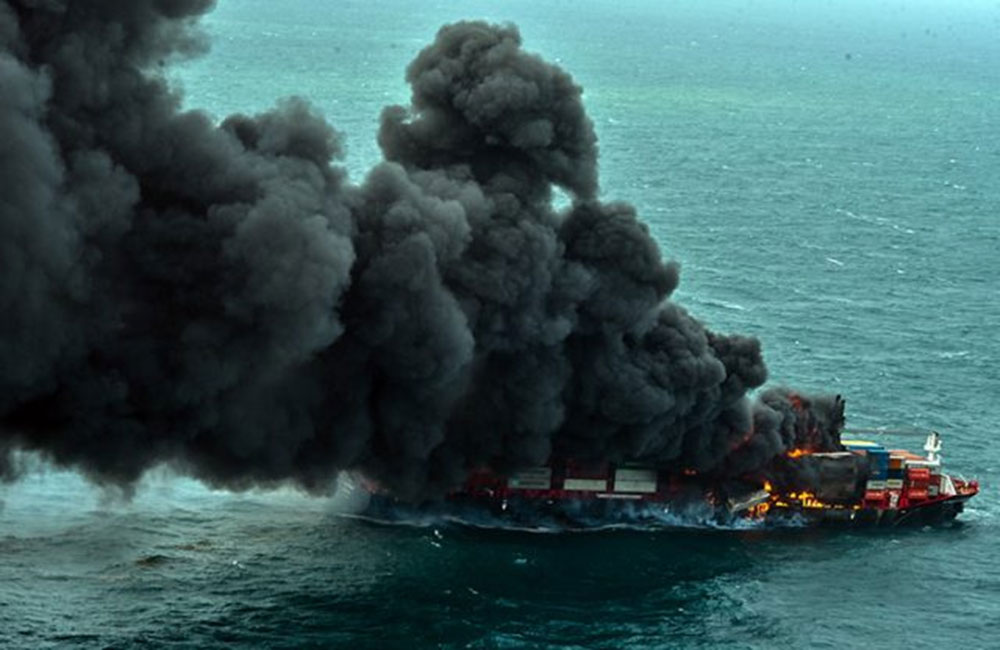
Ex-operators of X-Press Pearl make further payments to Sri Lanka
X-Press Feeders, former operators of the container ship 'X-Press Pearl', through the vessel owner’s P&I insurers, have made two further payments to the Sri Lankan government for claims relating to beach clean-up operations.
The payments totalling USD 878,650.53 and LKR 16,315,451.05 relate specifically to claims lodged by the Marine Environment Protection Authority of Sri Lanka in relation to beach cleaning and rehabilitation works in the aftermath of the sinking of the X-Press Pearl.
Resolution of these claims was discussed in recent meetings between a Sri Lankan Government delegation and representatives of the ship owners and their insurers in Singapore on the 18th and 19th of July 2023. Assessments on the payment of further claims are ongoing, with all legitimate claims being considered.
Meanwhile, a caretaker tug remains at the site monitoring the situation until the conclusion of the southwest monsoon season, when work will recommence to lift the remaining fore section of the wreck and transport it to a certified decommissioning facility for dismantling, recycling, and disposal.
Incident Overview
On May 20, 2021, the Singapore -flagged Containership, 'X-Press Pearl' reported smoke from the cargo hold while at Colombo anchorage, Sri Lanka.
Emergency procedures were initiated, and Co2 released in the cargo hold. Port control and the local authority were informed, and Sri Lankan navy assets along with firefighting teams were placed on standby.
On May 21, the vessel reported fire on deck. Firefighting tugs were deployed by the port authority and a helicopter providing support to help fight the fire. The ship's crew assisted with boundary cooling of the area.
The Harbour Master and Sri Lankan Navy were on standby to assist in case of evacuation.
Fire and chemical experts were contacted by the vessels operators, and Smit Salvage were appointed as Salvors.
On May 22, the sound of an explosion was heard in cargo hold #2.
Tugs continued the firefighting operation with Posh Teal, Posh Hardy, Megha, Hercules, Mahawewa deployed.
12 crew members disembarked from the vessel on May 23 to make way for a 12-person firefighting team. The firefighting team continued the operation in conjunction with water spraying tugs on site.
By May 24, the fire had intensified and was spreading toward the aft of the vessel.
A further and louder explosion was heard on May 25, and as a prudent measure, it was decided to evacuate all 13 crew and the firefighting team of 12. The crew and firefighting team were transferred to a quarantine facility ashore. Unfortunately, two crew members suffered leg injuries during evacuation and were taken to hospital for attention. All were reported to be in stable condition.
Firefighting tugs were operating on-site throughout May 26, with the assistance of Sri Lankan Navy helicopters and vessels and two Indian Coastguard vessels. To assist with the shoreline cleanup, three JCB diggers are provided to the MEPA for use by the mobilised defence force personnel. Due to the lockdown in Sri Lanka, only machinery can be provided, not manpower.
On May 27, efforts to extinguish the fire onboard were ongoing with firefighting tugs, the Sri Lankan Navy and Indian coastguard remaining on scene. All measures were being taken to save the vessel and cargo and protect the marine environment, and it appears that the onboard fire has diminished somewhat.
An inspection team were able to board the vessel on the afternoon of Tuesday, June 1, and reported the engine room flooded. There are concerns over the amount of water in the hull and its effect on the ship's stability. Efforts to make a connection for towing failed after several attempts due to the tug's movement caused by the swell. The operation was aborted for safety reasons.
Despite salvors subsequently boarding the vessel on June 2 and attaching a tow wire, efforts to move the ship to deeper waters failed, and the ships aft portion sank to the bottom at a depth of 21 meters. As of 1500 Sri Lanka time, the forward area of the vessel remained afloat with smoke coming out of Cargo Holds No 1 and 2.
Salvors remain on scene to deal with any possible debris supported by the Sri Lankan Navy and the Indian Coast Guard, who have oil spill response capabilities on standby.
Oil Spill Response Limited is appointed to respond to any possible spill and is liaising with ITOPF, who will provide technical expertise. Both OSRL and ITOPF have people on the ground in Colombo coordinating with the Sri Lankan Navy on an established plan to deal with any possible spill of oil and other pollutants.
On June 4, the ships aft portion remains on the seabed at a depth of about 21 meters, and the forward section continues to settle down slowly. Salvors were able to retrieve the anchor.
Navy divers retrieve the vessel's VDR on June 6 with still no signs of debris or fuel oil spill.
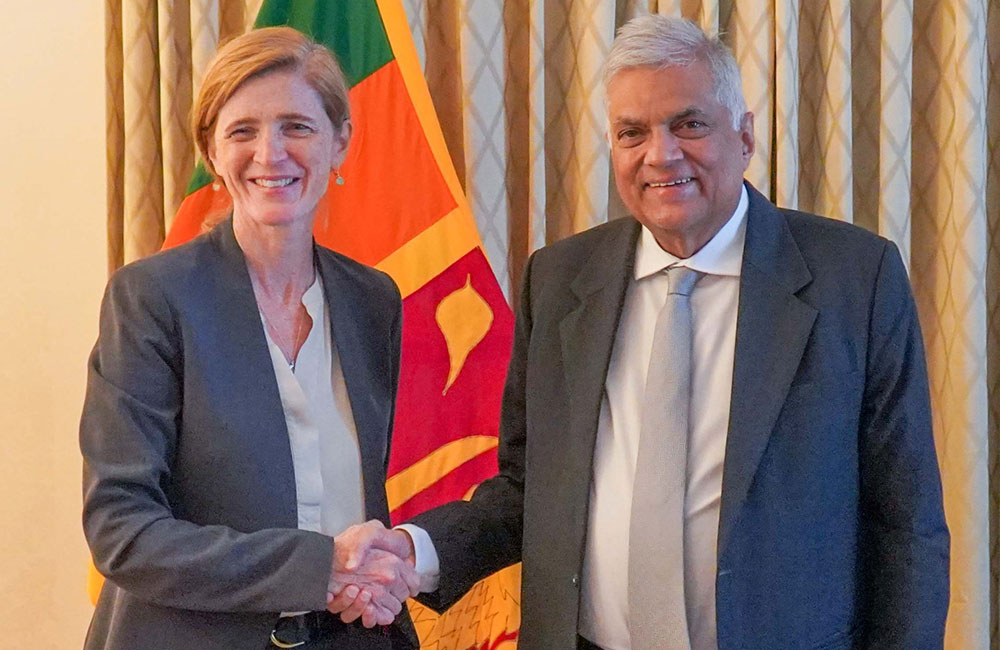
USAID will continue to support Sri Lanka’s recovery, Samantha Power assures President
President Ranil Wickremesinghe met with USAID Administrator, Samantha Power, on the sidelines of the UN General Assembly in New York.
During the discussions the President expressed his appreciation for the support extended by the United States Agency for International Development (USAID) to Sri Lanka during the financial crisis.
The President presented a short briefing on the progress with the IMF program, while highlighting the Government’s commitment to its successful conclusion, the statement said.
The efforts made by the Sri Lankan Government in improving the efficiency and effectiveness of the welfare programs through the introduction of the ‘Aswesuma’ initiative were illustrated during the meeting.
Samantha Power stated that USAID would continue to support Sri Lanka’s recovery efforts, while also making available necessary expertise.
Regarding the developments following the enactment of the anti-corruption legislation, President Ranil Wickremesinghe noted that the Anti-Corruption Commission is currently grappling with the task of recruiting staff with formal training.
Given this circumstance, it is anticipated that it will require an additional year to realize the anticipated outcomes of the anti-corruption law adoption, making the timeline for achievement approximately two years.
The President stated that the entire government machinery of his government has been fully adapted to the implementation of the anti-corruption policy, and requested for the necessary support to be provided for the completion of these activities as soon as possible.
PMD
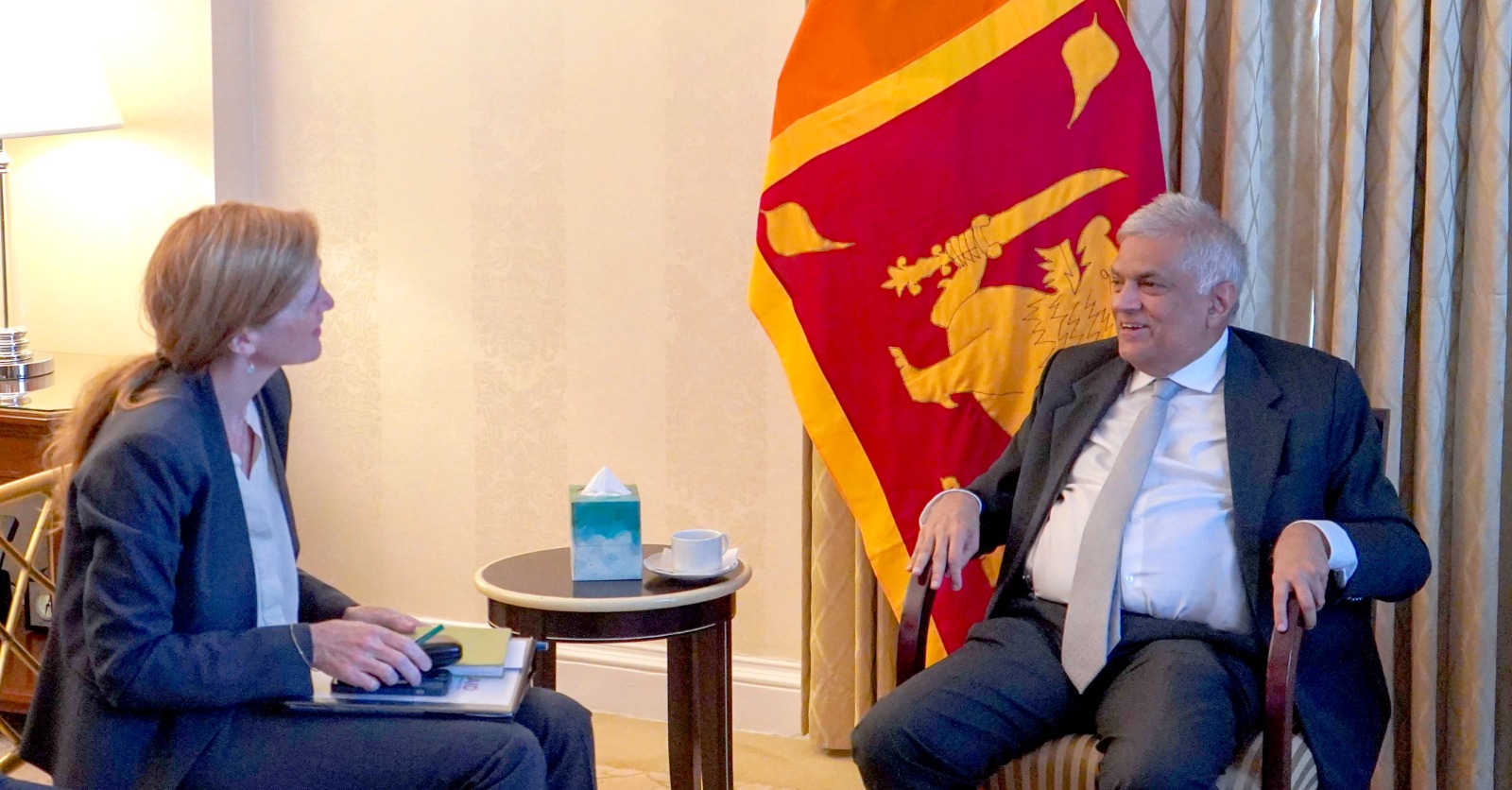
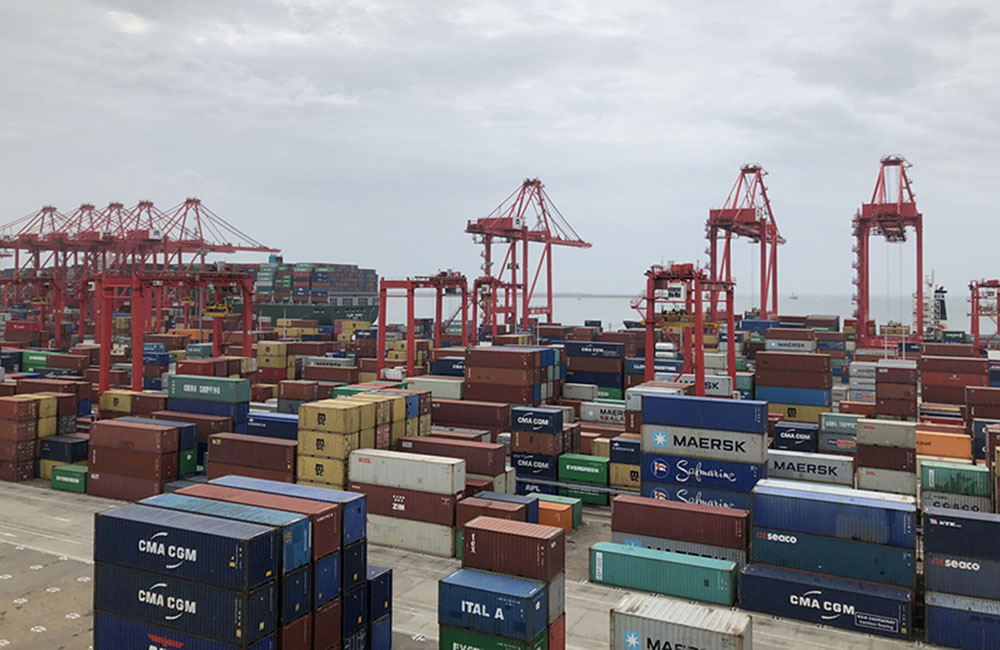
Sri Lanka to lift import restrictions on all items except vehicles
State Minister of Finance Shehan Semasinghe said that import restrictions on all items will be lifted in October 2023, with the exception of vehicles.
The State Minister said that the imports of personal items are considered comparatively less important, and this resulted in the continuation of import restrictions on vehicles.
He made the announcement at an IMF conference in Anuradhapura.
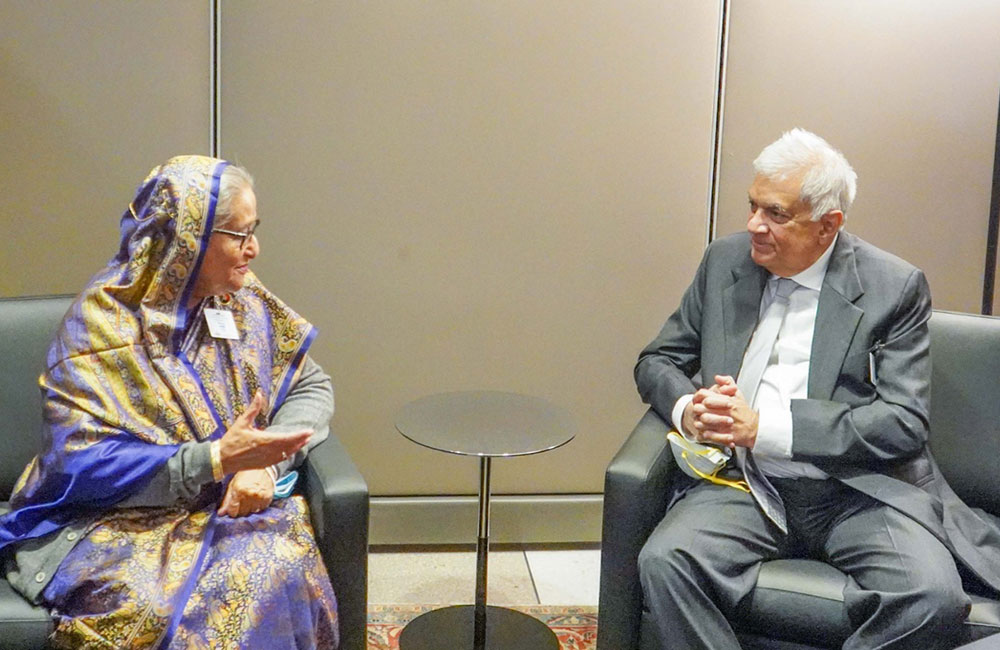
Bangladesh did not expect Sri Lanka to pay back the loan so fast
In a significant diplomatic meeting, President Ranil Wickremesinghe held a fruitful meeting with the Prime Minister of Bangladesh, Sheikh Hasina, in New York yesterday (19).
The meeting cantered on various aspects of bilateral relations and cooperation between the two South Asian nations.
Prime Minister Sheikh Hasina informed President Wickremesinghe that she was pleased with Sri Lanka’s speedy recovery from the financial crisis, adding that she had not expected Sri Lanka to pay back the loan so fast.
During the discussions, President Wickremesinghe extended his heartfelt gratitude to Prime Minister Sheikh Hasina and the people of Bangladesh for their unwavering support and assistance to Sri Lanka during challenging times.
He acknowledged the assistance received by Sri Lanka and expressed his profound appreciation for Bangladesh’s generosity. President Wickremesinghe, in a gracious gesture, also apologized for not being able to visit Bangladesh in the past due to various commitments and circumstances. He affirmed his desire to strengthen the ties between the two countries and proposed the possibility of visiting Bangladesh in November or December, aligning with the convenience of the Bangladeshi government.
In a more personal exchange, Prime Minister Sheikh Hasina shared the tragic history of her family, recounting the devastating assassinations that had befallen her loved ones. The cordial conversation between the two leaders allowed for a deeper understanding of each other’s experiences and aspirations. (PMD)
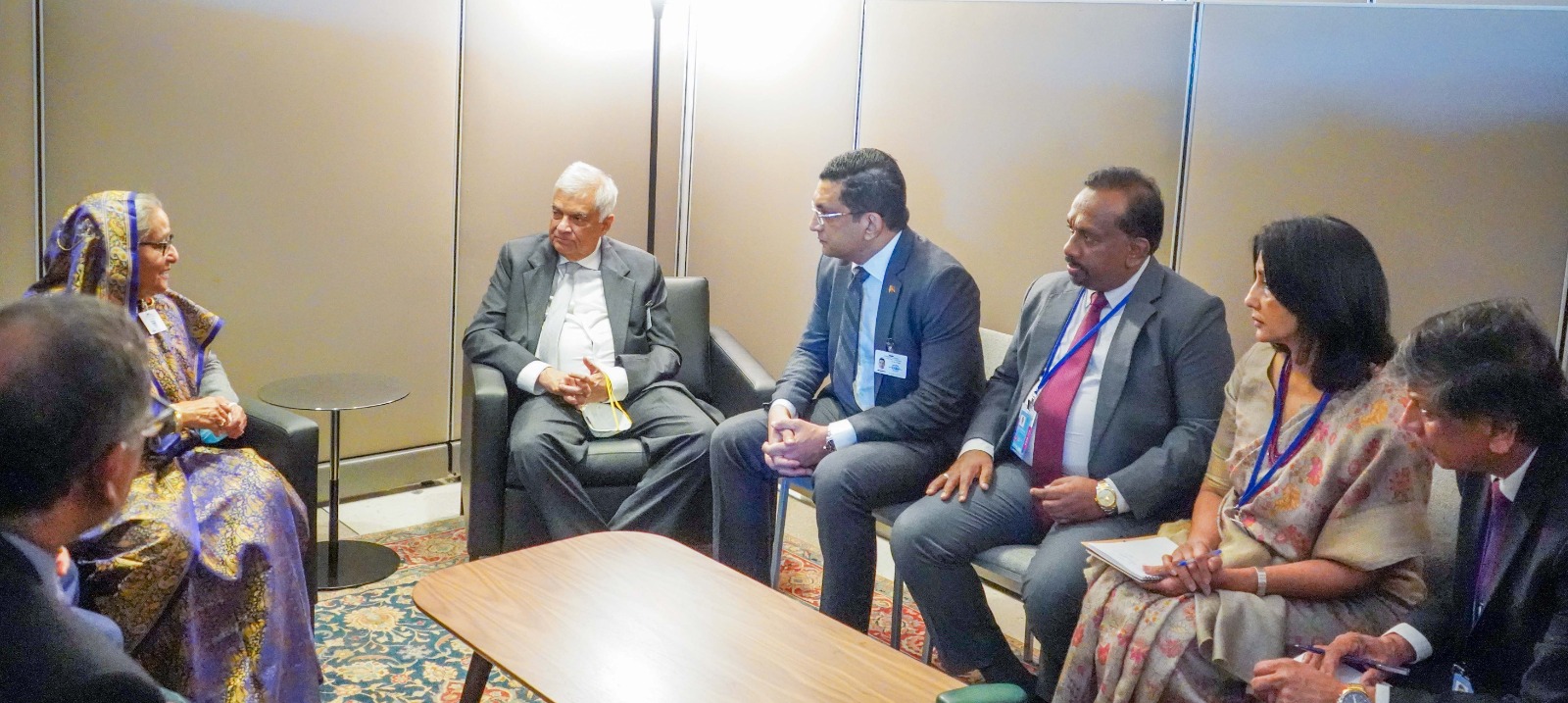
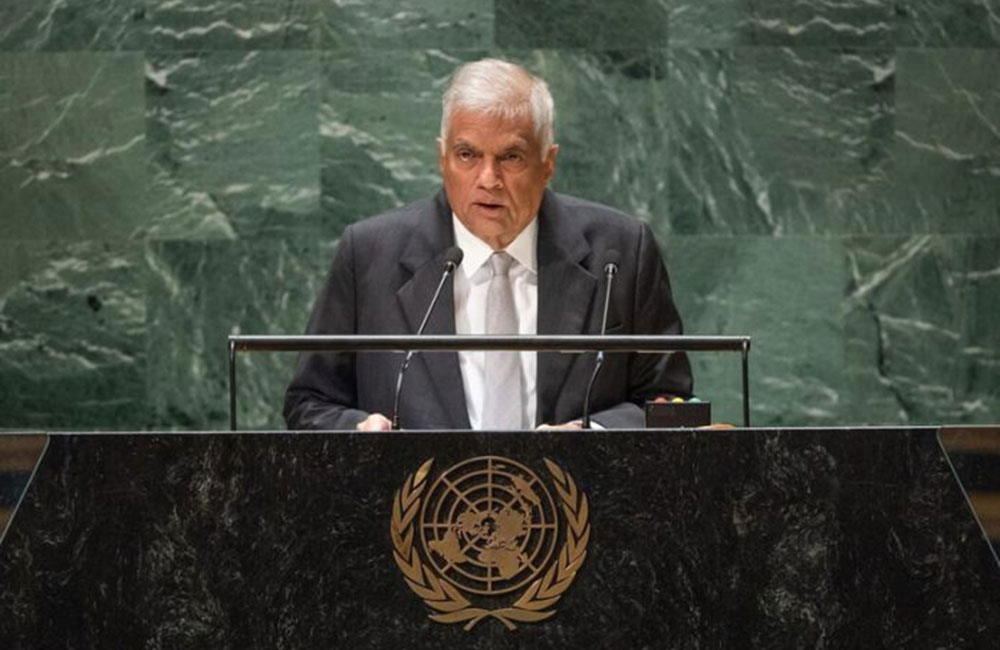
President Ranil Wickremesinghe’s address to the UN General Assembly
Addressing the UN General Assembly in NY President Ranil Wickremesinghe pledged to lead Sri Lanka towards sustainable growth, ensuring peace and prosperity for all, with the support of both the nation and the international community.
President Ranil Wickremesinghe told the UNGA that currently, there’s a stark contrast with the 2030 promise, as poverty & hunger levels are at multi-decade highs. Neutral nations like Sri Lanka in the global South find themselves caught between shifting global power dynamics.
The President said at the UNGA that crises like climate change & pandemics are hampering smaller indebted countries like Sri Lanka from advancing SDGs & climate efforts. Global power conflicts are adding economic uncertainty, disrupting supply chains & causing inflation, food, and energy insecurity worldwide.
President Wickremesinghe pledged before the UNGA that Sri Lanka is committed to climate action. At COP27, they unveiled the Climate Ambition Plan, aiming for 70% renewable energy in electricity by 2030, a 32% increase in forest cover, a 14.5% reduction
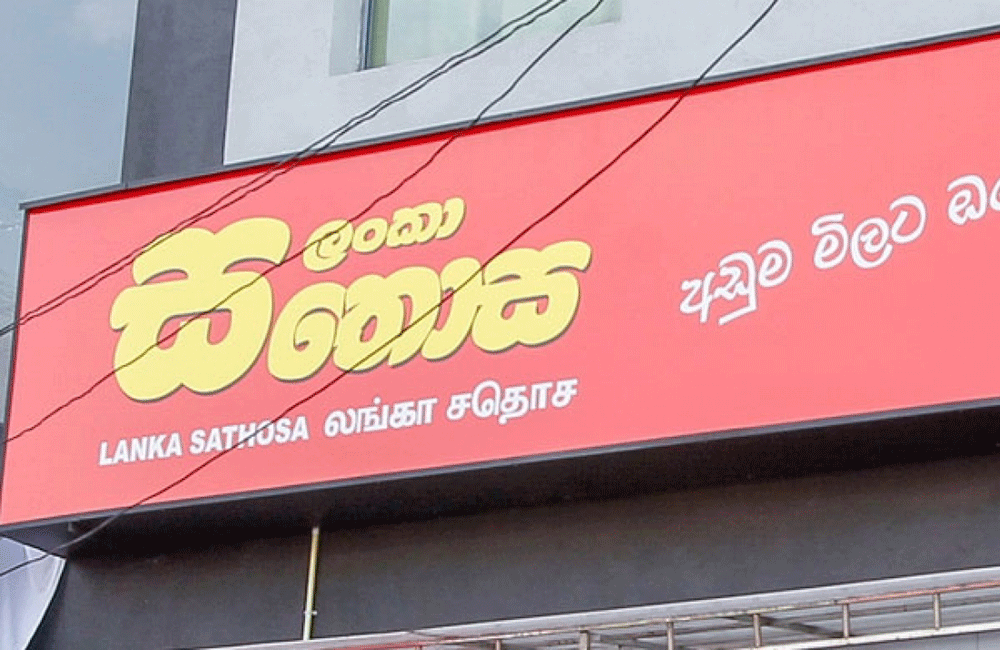
Lanka Sathosa reduces prices of 06 essential food items
Lanka Sathosa, on Wednesday (20 Sep.), reduced the prices of six essential food items.
Issuing a release, the state-owned corporation stated that the relevant price reduction will be in effect from today.
Accordingly, the prices of the following goods have been reduced:
• Soya meat - Rs.580 per kilogram (reduced by Rs.45)
• Local Potatoes - Rs.290 per kilogram (reduced by Rs.40)
• Thai sprats - Rs.1,100 per kilogram (reduced by Rs.30)
• Garlic – Rs.620 per kilogram (reduced by Rs.30)
• Big onions – Rs.195 per kilogram (reduced by Rs.15)
• Red lentils – Rs. 299 per kilogram (reduced by Rs.06)
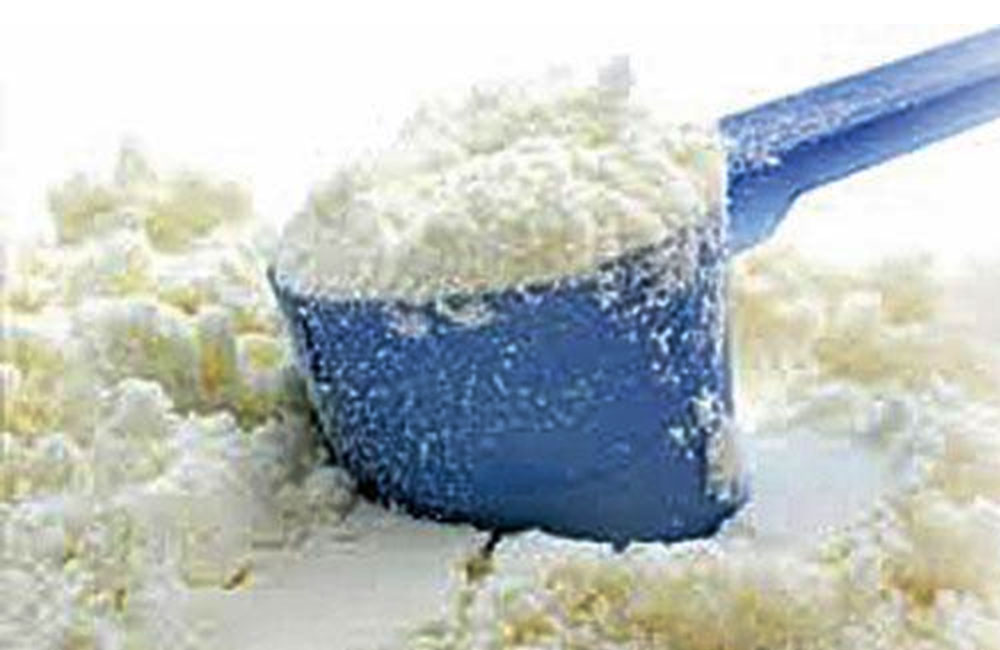
Milk powder import tax increased
Port and Airport Levy (PAL) on imported milk powder has been increased by 10 percent, says Trade Minister Nalin Fernando.
However, Minister assures that this tax hike would not lead to an increase in the prices of milk powder.
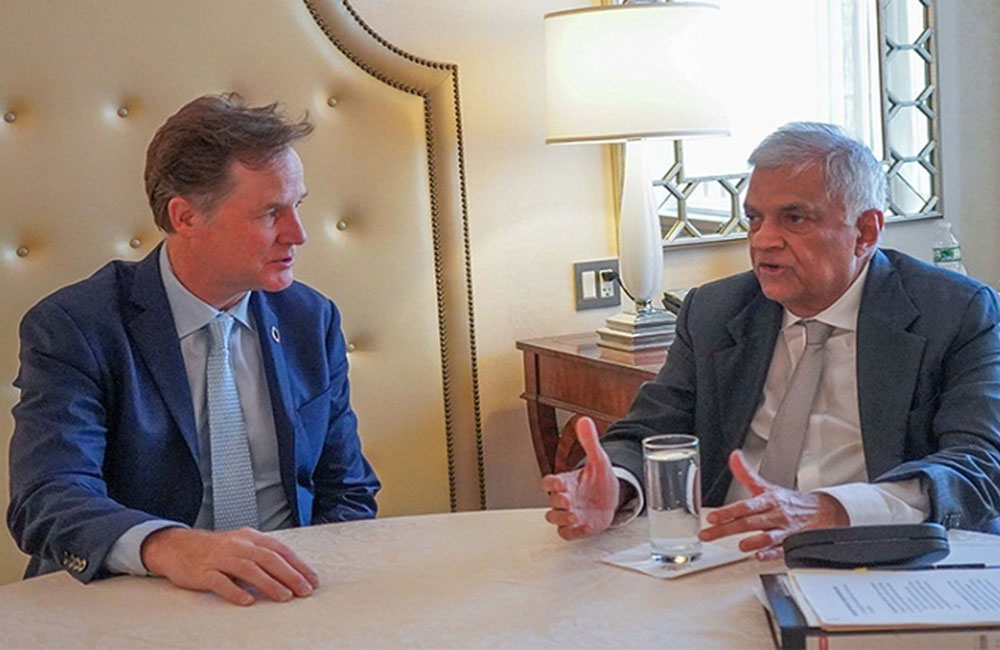
President meets Facebook (META), discuss two initiatives
President Ranil Wickremesinghe met with Sir Nick Clegg, President of Global Affairs for Meta, in New York on the side-lines of the United Nations General Assembly (UNGA).
During their discussions, President Wickremesinghe highlighted the government’s new initiatives to combat online hate speech and the spread of fake news. He emphasized that the proposed bill would allow concerned parties to challenge specific aspects through the Supreme Court and further revisions could be considered during the Parliamentary Committee review.
The President was briefed on Meta’s advancements in Artificial Intelligence, with a particular emphasis on open-source technologies.
Both parties explored potential collaborations between the Sri Lankan Government and Meta in the field of Artificial Intelligence (AI). One of the proposals discussed was the development of a collaborative program between Meta and Sri Lankan universities aimed at advancing AI technology.
President Wickremesinghe emphasized his two primary areas of focus: fostering the growth of the AI sector in the country, especially in the realm of education and utilizing AI to support data-driven initiatives aimed at addressing climate change. (PMD)
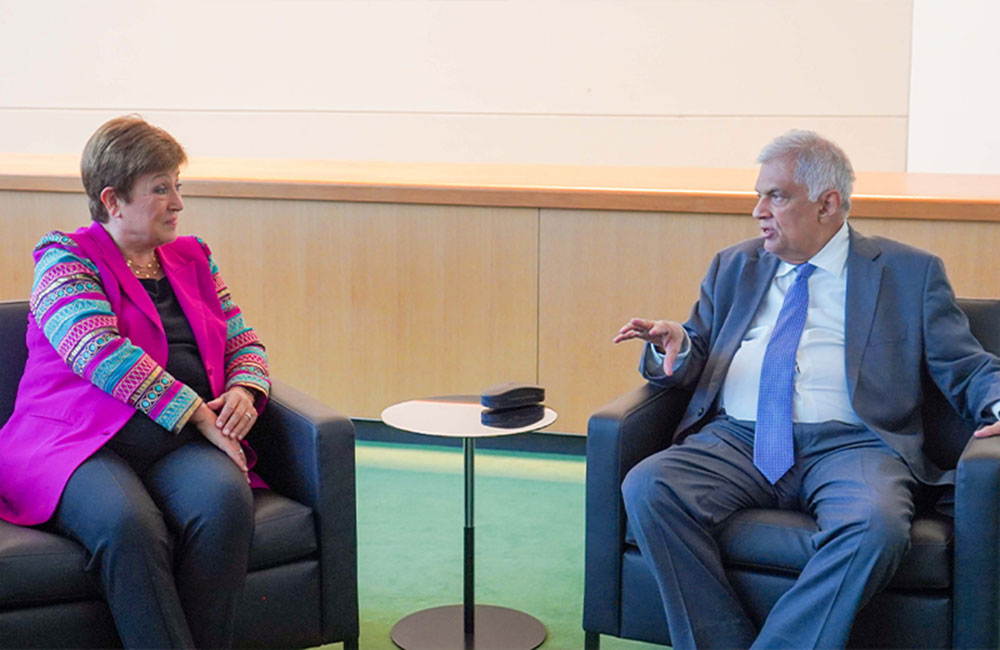
IMF Chief commends SL's progress during meeting with president
In a crucial meeting held during the United Nations General Assembly (UNGA) in New York, Managing Director of the International Monetary Fund (IMF), Ms. Kristalina Georgieva, met with President, Ranil Wickremesinghe, to discuss vital economic matters.
During the meeting, Ms. Georgieva and President Wickremesinghe delved into the ongoing financial sector reforms and the substantial progress made in debt restructuring initiatives. The IMF Managing Director commended the Sri Lankan government for its effective measures in curbing inflation and nurturing a conducive environment for business growth, as well as the flourishing tourism industry. She expressed her satisfaction with the government’s commitment to enhancing the overall economic landscape.
Notable figures attending this significant meeting included Sri Lanka’s Foreign Minister, Mr. Ali Sabry, President’s Secretary Mr. Saman Ekanayake, Ambassodor Mr. Mahinda Samarasinghe, UN Permanent Representative Mr. Mohan Peiris and President’s Advisor Mr. Dinesh Weerakkody alongside senior officials representing both Sri Lanka and the International Monetary Fund.
PMD

President joins business roundtable during 78th UNGA session
In conjunction with the 78th session of the United Nations General Assembly (UNGA), President Ranil Wickremesinghe actively participated in two significant events in New York, the President’s Media Division (PMD) reported.
President Wickremesinghe took part in a high-profile business roundtable discussion titled “Economic Opportunities in Sri Lanka”, jointly organised by the Business Council for International Understanding and the Embassy of Sri Lanka in the United States of America, which took place yesterday (18 Sep.).
The business roundtable saw participation from more than 40 U.S. businesses keen on exploring investment and trade prospects in Sri Lanka.
Alongside them were prominent representatives from Sri Lanka’s private sector and a delegation of senior officials from the United States government. This discussion aimed to foster economic opportunities and strengthen bilateral relations between the two nations.
Meanwhile, President Wickremesinghe also participated in the “Conference on Sustainable Development Goals – 2023,” which commenced yesterday at the UN Headquarters, focusing on exploring new strategies to advance progress toward achieving sustainable development goals by 2030.
Ruwan Wijewardena, President’s Senior Adviser on Climate Change, Saman Ekanayake, Secretary to the President and Aruni Wijewardena, Secretary of the Ministry of Foreign Affairs, were also present on this occasion.
Page 250 of 684